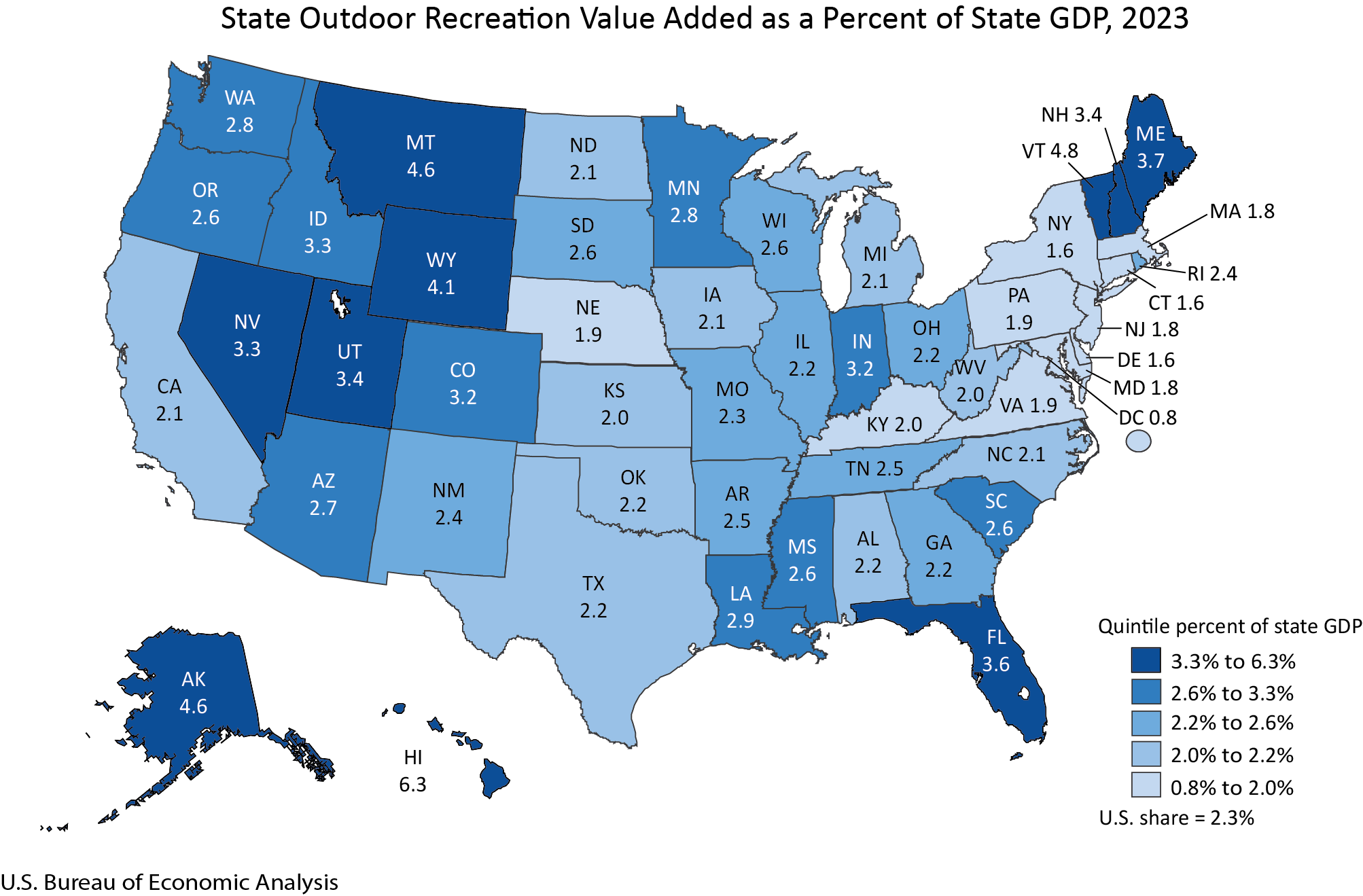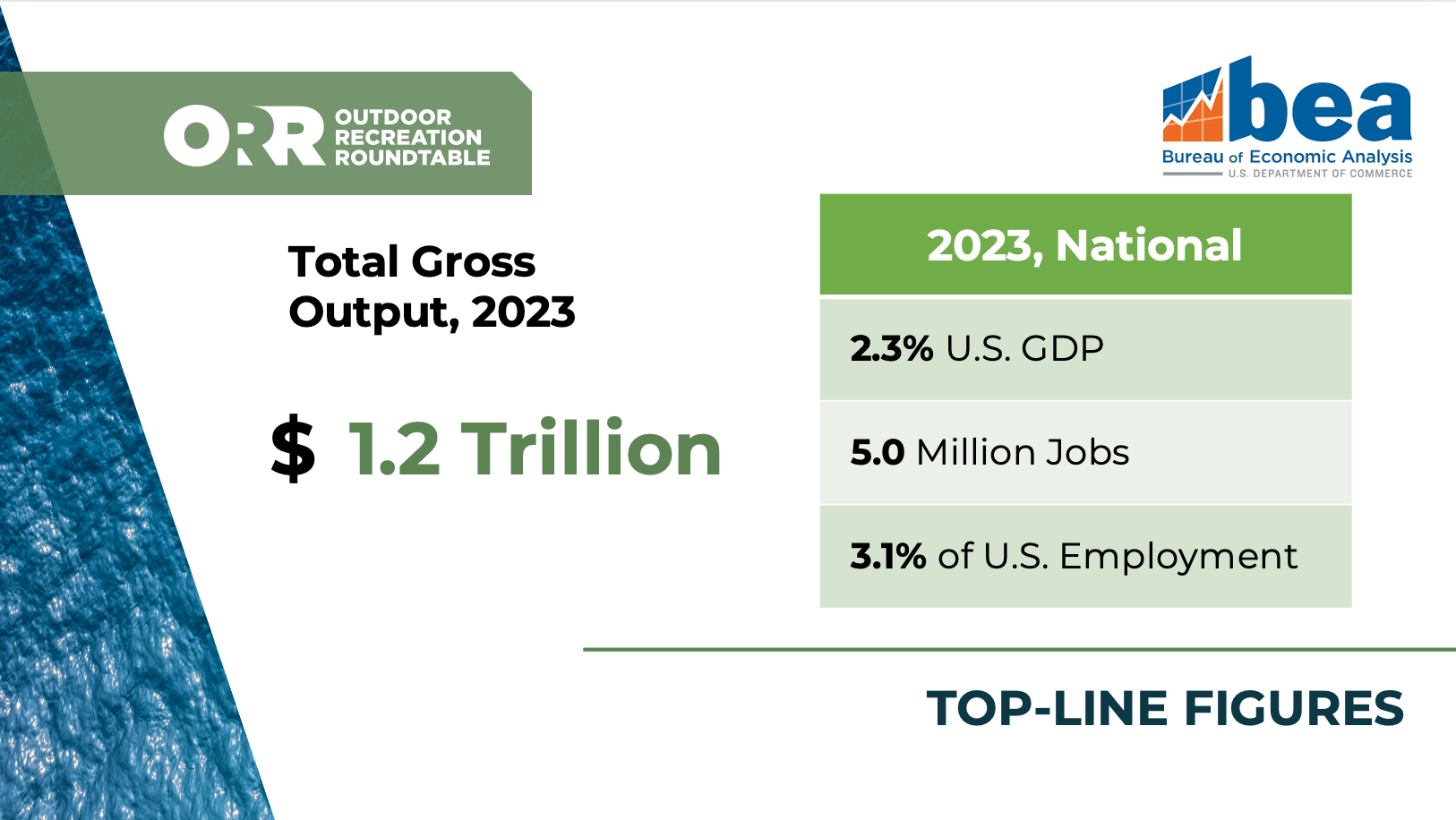12/05/24
Best of the West: Outdoor recreation generates $1.2 trillion; growing crops with less water; training pilots in Utah; coral reefs; supporting rural healthcare

The Western Governors' Association keeps you updated on the latest news in the West. Here are the top stories for the week starting December 2, 2024. (Photos courtesy of Adobe Stock Images, U.S. Department of Commerce Bureau of Economic Analysis, and the Outdoor Recreation Roundtable).
A recent report from the U.S. Department of Commerce’s Bureau of Economic Analysis found that the nation’s outdoor recreation industry generated $1.2 trillion in economic output in 2023. The industry grew three times faster than the economy as a whole and grew to account for 2.3% of the country’s total GDP.
Additionally, the outdoor recreation industry supported 5 million jobs across the country, representing 3.1% of all U.S. employees.
In western states, particularly those in the mountain west, outdoor recreation accounted for a far higher share of the local economic output than the national average.
In states like Montana and Wyoming, outdoor recreation accounted for 4.6% and 4.1% of state GPD, respectively, as compared to 2.3% nationally. Montana and Wyoming were only rivaled by Alaska, where 4.6% of the state’s GDP is from outdoor recreation, and Hawaii, which saw the industry drive a nation-leading 6.3% of GDP.
A record 175.8 million Americans are now enjoying the outdoors every year, with a wide variety of activities being pursued.
In terms of total value added to the economy, boating and fishing held the largest share last year, bringing in $36.8 billion. The fastest growing activities in the country were bicycling and snow activities, with those two showing 26.6% and 25.2% growth last year.
Snow sports like skiing and snowmobiling were the top activities in states like Colorado and Utah, which were joined by California to round out the top three states for economic output from snow sports.
activities in states like Colorado and Utah, which were joined by California to round out the top three states for economic output from snow sports.
Groups in the industry like the Outdoor Recreation Roundtable are pointing to these strong economic numbers to advocate for legislation like the EXPLORE Act, which would support streamlined access to the outdoors, build trail systems for hiking and biking, improve visitor experience, and a host of other measures.
Western Governors recently expressed their support for aspects of the EXPLORE Act with a letter to Senate leadership.
“The West’s world-class outdoor recreation destinations draw increasing numbers of visitors each year,” read the letter, which was signed by New Mexico Governor Michelle Lujan Grisham and Utah Governor Spencer Cox. “However, those areas need support, infrastructure, and tools to manage increasing levels of recreation while maintaining these resources for the enjoyment of all, and for future generations.”
Growing more with less water: the U.S. Department of Agriculture (USDA) is spending $60 million to help farmers in tribal communities grow their crops with less water.
The funds will help tribes in New Mexico, Arizona, and Colorado create more efficient irrigation systems. It can also be used to help farmers switch their production away from high-water crops like alfalfa and towards crops like lettuce, grapes, and tomatoes that fetch a higher price while requiring less water.
Training pilots in Utah: Just west of Salt Lake City International Airport, Governor Spencer Cox attended the ribbon-cutting ceremony for Delta Airlines’ new 50,000-square-foot pilot training center.
The $50 million facility is Delta’s largest pilot training investment in over a decade, and it’s the company’s first facility to be located outside of its headquarters in Atlanta. Salt Lake City has long been a hub for Delta and the new training facility cements its presence in the city.
The training center will feature multiple plane simulators for pilots to train on, and it is expected to bring in hundreds of pilots a month from across the region.
Restoring coral reefs: the National Fish and Wildlife Foundation and the National Oceanic and Atmospheric Administration are awarding millions to Guam to support the Guam Coral Reef Initiative.
The funds will help restore Guam’s coral reefs by expanding ocean-based coral nursery capacity and enhancing species diversity. Healthy coral reefs support robust fisheries, create more resilient marine ecosystems, mitigate flooding and coastal erosion, and boost Guam’s tourism economy.
Rural healthcare in NM: four rural health care organizations in New Mexico will receive $5.4 million to help expand healthcare access to rural communities, according to a recent announcement from Governor Michelle Lujan Grisham.
The funding marks the first allocation from the Governor’s $46 million fund to support rural health care, and it will go towards maternal health, behavioral health, and primary care services.
“Every New Mexican deserves access to quality health care close to home,” said Governor Lujan Grisham. “Rural health care providers are lifelines in their communities. This funding is a bold investment in the health and dignity of our rural communities, ensuring no New Mexican is left behind.”